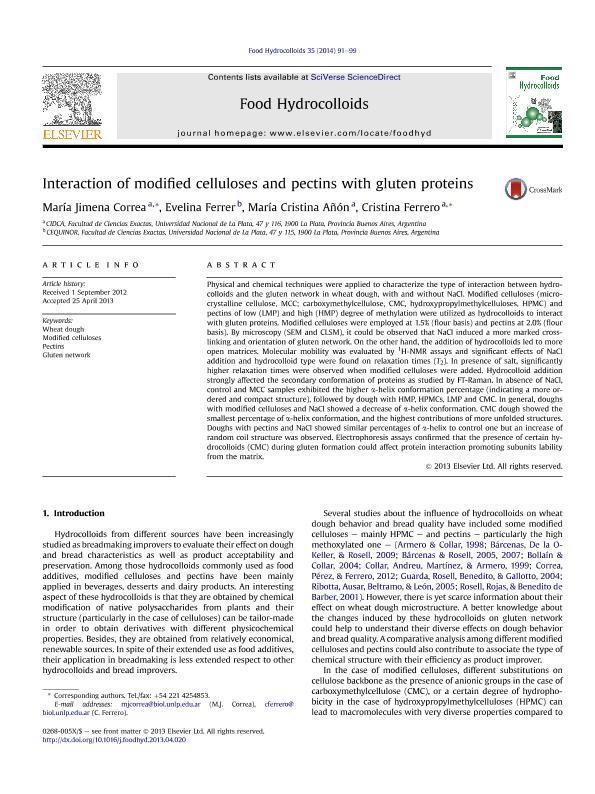Mostrar el registro sencillo del ítem
dc.contributor.author
Correa, María Jimena

dc.contributor.author
Ferrer, Evelina Gloria

dc.contributor.author
Añon, Maria Cristina

dc.contributor.author
Ferrero, Cristina

dc.date.available
2020-01-07T16:29:59Z
dc.date.issued
2014-03
dc.identifier.citation
Correa, María Jimena; Ferrer, Evelina Gloria; Añon, Maria Cristina; Ferrero, Cristina; Interaction of modified celluloses and pectins with gluten proteins; Elsevier; Food Hydrocolloids; 35; 3-2014; 91-99
dc.identifier.issn
0268-005X
dc.identifier.uri
http://hdl.handle.net/11336/93782
dc.description.abstract
Physical and chemical techniques were applied to characterize the type of interaction between hydrocolloids and the gluten network in wheat dough, with and without NaCl. Modified celluloses (microcrystalline cellulose, MCC; carboxymethylcellulose, CMC, hydroxypropylmethylcelluloses, HPMC) and pectins of low (LMP) and high (HMP) degree of methylation were utilized as hydrocolloids to interact with gluten proteins. Modified celluloses were employed at 1.5% (flour basis) and pectins at 2.0% (flour basis). By microscopy (SEM and CLSM), it could be observed that NaCl induced a more marked crosslinking and orientation of gluten network. On the other hand, the addition of hydrocolloids led to more open matrices. Molecular mobility was evaluated by 1H-NMR assays and significant effects of NaCl addition and hydrocolloid type were found on relaxation times (T2). In presence of salt, significantly higher relaxation times were observed when modified celluloses were added. Hydrocolloid addition strongly affected the secondary conformation of proteins as studied by FT-Raman. In absence of NaCl, control and MCC samples exhibited the higher α-helix conformation percentage (indicating a more ordered and compact structure), followed by dough with HMP, HPMCs, LMP and CMC. In general, doughs with modified celluloses and NaCl showed a decrease of α-helix conformation. CMC dough showed the smallest percentage of α-helix conformation, and the highest contributions of more unfolded structures. Doughs with pectins and NaCl showed similar percentages of α-helix to control one but an increase of random coil structure was observed. Electrophoresis assays confirmed that the presence of certain hydrocolloids (CMC) during gluten formation could affect protein interaction promoting subunits lability from the matrix.
dc.format
application/pdf
dc.language.iso
eng
dc.publisher
Elsevier

dc.rights
info:eu-repo/semantics/openAccess
dc.rights.uri
https://creativecommons.org/licenses/by-nc-sa/2.5/ar/
dc.subject
GLUTEN NETWORK
dc.subject
MODIFIED CELLULOSES
dc.subject
PECTINS
dc.subject
WHEAT DOUGH
dc.subject.classification
Alimentos y Bebidas

dc.subject.classification
Otras Ingenierías y Tecnologías

dc.subject.classification
INGENIERÍAS Y TECNOLOGÍAS

dc.title
Interaction of modified celluloses and pectins with gluten proteins
dc.type
info:eu-repo/semantics/article
dc.type
info:ar-repo/semantics/artículo
dc.type
info:eu-repo/semantics/publishedVersion
dc.date.updated
2019-10-28T18:26:00Z
dc.journal.volume
35
dc.journal.pagination
91-99
dc.journal.pais
Países Bajos

dc.journal.ciudad
Amsterdam
dc.description.fil
Fil: Correa, María Jimena. Provincia de Buenos Aires. Gobernación. Comisión de Investigaciones Científicas. Centro de Investigación y Desarrollo en Criotecnología de Alimentos. Consejo Nacional de Investigaciones Científicas y Técnicas. Centro Científico Tecnológico Conicet - La Plata. Centro de Investigación y Desarrollo en Criotecnología de Alimentos. Universidad Nacional de la Plata. Facultad de Ciencias Exactas. Centro de Investigación y Desarrollo en Criotecnología de Alimentos; Argentina. Universidad Nacional de La Plata. Facultad de Ciencias Exactas; Argentina; Argentina
dc.description.fil
Fil: Evelina Ferrer. Consejo Nacional de Investigaciones Científicas y Técnicas. Centro Científico Tecnológico Conicet - La Plata. Centro de Química Inorgánica "Dr. Pedro J. Aymonino". Universidad Nacional de La Plata. Facultad de Ciencias Exactas. Centro de Química Inorgánica "Dr. Pedro J. Aymonino"; Argentina. Universidad Nacional de La Plata. Facultad de Ciencias Exactas; Argentina
dc.description.fil
Fil: Maria Cristina Añón. Provincia de Buenos Aires. Gobernación. Comisión de Investigaciones Científicas. Centro de Investigación y Desarrollo en Criotecnología de Alimentos. Consejo Nacional de Investigaciones Científicas y Técnicas. Centro Científico Tecnológico Conicet - La Plata. Centro de Investigación y Desarrollo en Criotecnología de Alimentos. Universidad Nacional de la Plata. Facultad de Ciencias Exactas. Centro de Investigación y Desarrollo en Criotecnología de Alimentos; Argentina. Universidad Nacional de La Plata. Facultad de Ciencias Exactas; Argentina; Argentina
dc.description.fil
Fil: Ferrero, Cristina. Provincia de Buenos Aires. Gobernación. Comisión de Investigaciones Científicas. Centro de Investigación y Desarrollo en Criotecnología de Alimentos. Consejo Nacional de Investigaciones Científicas y Técnicas. Centro Científico Tecnológico Conicet - La Plata. Centro de Investigación y Desarrollo en Criotecnología de Alimentos. Universidad Nacional de la Plata. Facultad de Ciencias Exactas. Centro de Investigación y Desarrollo en Criotecnología de Alimentos; Argentina. Universidad Nacional de La Plata. Facultad de Ciencias Exactas; Argentina; Argentina
dc.journal.title
Food Hydrocolloids

dc.relation.alternativeid
info:eu-repo/semantics/altIdentifier/url/http://www.sciencedirect.com/science/article/pii/S0268005X13001355#
dc.relation.alternativeid
info:eu-repo/semantics/altIdentifier/doi/http://dx.doi.org/10.1016/j.foodhyd.2013.04.020
Archivos asociados
